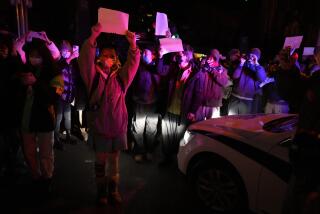Key China Aides Urge Caution in Westernizing : Traditionalists Seen Using Student Unrest to Hit Open-Door Policies; Peking Protests Continue
- Share via
PEKING — A group of five senior Chinese Communist Party officials were reported Monday to have made an extraordinary appearance in which they warned their countrymen against excessive Westernization and indirectly sought to blame recent student demonstrations on this trend.
It was the first indication that tradition-minded conservatives in the party are using this month’s wave of student protests to attack the open-door policies and economic reforms fostered by Chinese leader Deng Xiaoping.
At a Sunday cultural session, the five men seized the opportunity to discuss the recent demonstrations, and their remarks were reported Monday by the official New China News Agency.
Among the party elders were Politburo member Hu Qiaomu and former party propaganda chief Deng Liqun, the two men who three years ago spearheaded an intense but short-lived campaign against “spiritual pollution” in China, a code word for Western influence.
Hu, a leading party theoretician, also complained about the regime’s overemphasis on profit incentives, saying that “our work’s starting point and purpose is to serve people, and it is wrong to indulge in seeking money only.”
Meanwhile, the effort to keep student protests out of the nation’s capital failed as hundreds of students roamed through the streets in the early-morning hours to keep alive their demonstrations on behalf of democracy.
The new protests began at Peking Teachers’ College, where an estimated 300 students, some of them beating drums and carrying torches, marched out of their campus shortly before 2 a.m. to call for support from other universities nearby.
In the next five hours, the students visited three other campuses and succeeded in swelling their number to about 3,000.
Shortly after sunrise the students stood in the snow at Qinghua University, one of China’s leading science institutions, chanting such slogans as “We want freedom!” and “Abolish the regulations!”
The latter refered to rules adopted by Peking authorities last week that prohibit all demonstrations except those that have been given official approval with five days’ advance notice.
Confrontation Avoided
Although Monday’s protest appeared to violate the new regulations, the police generally avoided any direct confrontation with the students.
Later in the day, policemen were stationed at the gates of all universities in Peking--even at training schools like the Peking Iron and Steel College--barring outsiders from entering the campuses without official permission.
“Usually we would let you in, since there is no rule against it,” a policeman at Qinghua told a foreign visitor, “but this will last until the students stop demonstrating.”
One wallposter at Peking University on Monday called for mass demonstrations on New Year’s Day at Tian An Men Square in the historic center of Peking, where demonstrations were completely forbidden by the rules issued last week.
On Monday night, policemen at the teachers’ college were seen holding back a group of at least 200 students who were apparently trying to burst through the gates and move off the university campus. The police pulled one student out of the crowd and led him away.
The stationing of police at the university gates was one of several signs that the Chinese leadership is adopting a new and tougher stance toward the students.
‘Cardinal Principles’
The Communist Party organ People’s Daily and several other leading newspapers carried front-page commentaries Monday warning that those who advocate democracy will not be allowed to undermine the “four cardinal principles” set out in the Chinese constitution.
These are adherence to socialism, the people’s democratic dictatorship, the leadership of the Communist Party and belief in Marxism, Leninism and the thoughts of Mao Tse-tung.
An editorial in the Peking Daily reminded city residents that wallposters are illegal and that those who put them up can be sentenced to three years in prison. Also, if wallposters advocate the overthrow of the dictatorship of the proletariat, the commentary said, those who put them up can be sentenced to prison or labor reform for up to five years.
Besides Hu and Deng Liqun, the party officials who sought to link the student protests with China’s trend toward Westernization included three vice chairmen of the party’s Central Advisory Commission, Wang Zhen, Bo Yibo and Song Renqiong. The advisory commission is a body of party elders headed by Deng, the national leader.
‘National Nihilism’
During the Sunday cultural session, Wang, a former vice premier and Politburo member, criticized unspecified people for “spreading national nihilism and denigrating China and advocating all-round Westernization,” the New China News Agency reported.
Bo, too, denounced the advocacy of “complete Westernization,” saying he felt that this would be a “denial of the socialist system.”
More to Read
Sign up for Essential California
The most important California stories and recommendations in your inbox every morning.
You may occasionally receive promotional content from the Los Angeles Times.













